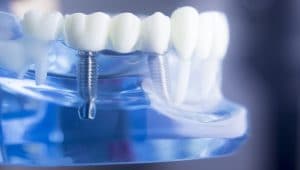 Even if you grow accustomed to how your smile looks with one or more missing teeth, your other teeth and oral structures never will. In addition to appearance, the effects of tooth loss can include the shifting of other teeth, the erosion of your jawbone, and much more that can have an increasingly negative impact on your oral health. At our Encinitas/San Diego periodontal office, we can help you effectively address those consequences and minimize their effect on your oral health by replacing your lost teeth with one or more dental implants.
Even if you grow accustomed to how your smile looks with one or more missing teeth, your other teeth and oral structures never will. In addition to appearance, the effects of tooth loss can include the shifting of other teeth, the erosion of your jawbone, and much more that can have an increasingly negative impact on your oral health. At our Encinitas/San Diego periodontal office, we can help you effectively address those consequences and minimize their effect on your oral health by replacing your lost teeth with one or more dental implants.
1. How dental implants work
The first thing to know about dental implants is how they work. A dental implant is a small post that your periodontist inserts into your jawbone in place of a lost tooth root. Its purpose is to support a lifelike dental crown (for a single lost tooth) or bridge or denture (for multiple lost teeth) without the need for abutment teeth, clasps, or adhesives. After an implant is placed in your jawbone, your jawbone fuses to the implant’s biocompatible surface, making it almost as secure a healthy, natural tooth root.
2. What you might need first
For dental implants to work, your jawbone must go through a process known as osseointegration – or the fusing of your jawbone to the implant post(s). This requires that your jawbone be strong and healthy enough to facilitate the process, as well as to support the implant or implants long after the procedure. To ensure their success, we’ll first thoroughly examine your oral health and jawbone structure to ensure that your jawbone is strong and healthy enough. We’ll also ensure that gum disease isn’t present, which could erode the periodontal tissues and jawbone structure that support your implant posts and other teeth.
3. How your smile benefits
One of the biggest ways for your jawbone to lose density and grow weaker is to lose a tooth root and never replace it. The loss of the root diminishes stimulation in your jawbone, which causes your body to send it fewer nutrients. Over time, your jawbone will lose mass and density, and in some cases, bone grafting is necessary to fortify it before dental implants can be placed. If gum disease is present, you may also require specialized treatment and maintenance to control it before we can recommend implant placement.
Ask us about dental implants
Dental implants can offer a variety of benefits for your smile and oral health, and you may be a good candidate if you’ve lost one or more teeth. For more information about getting dental implants, schedule a consultation with Dr. Kania by calling her periodontal office in Encinitas/San Diego, CA, at (760) 642-0711.



